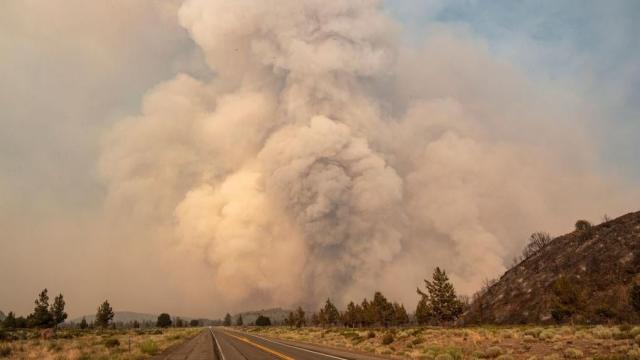Regional wildfire smoke is significantly lowering air quality for millions of people across the country.
A new study published in Environmental Science & Technology found that wildfires are creating more air pollution every year. They especially create particle pollution known as PM2.5, which can cause short-term health concerns like nose, eye, and lung irritation. Long-term exposure can create or worsen existing respiratory and cardiovascular issues.
According to the study, about 25 million people were exposed to wildfire particles during an especially bad day in 2020. “So this is just people exposed on what we call an extreme day of wildfire smoke,” Marshall Burke, one of the study’s co-authors and a Stanford University scientist, told Earther.
The number of people in the U.S. exposed to dangerous levels of wildfire-related particles, which the study categorised as PM2.5 concentrations reaching at least 100 micrograms per cubic metre, have increased more than 27-fold in the last decade. The number of people exposed to extreme levels of pollution from wildfire smoke grew 11,000-fold during that time. These days were categorised by PM2.5 concentrations that reached 200 micrograms per cubic metre of air.
Burke and other researchers looked at satellite images of wildfire smoke from 2006 to 2020. They compared the images to data from air quality monitors to see if the spikes in pollution coincided with wildfire smoke. But air quality monitors are not distributed equally across the country, so the scientists filled in data gaps by training a machine learning model to use satellite data in order to accurately predict PM2.5 concentrations.
They also found that high-income communities and Hispanic communities have been disproportionately impacted by particles from wildfire smoke. Burke explained that this reflects demographics in heavily impacted states, like California. There are a lot of Hispanic communities in that state, along with extremely wealthy zip codes along the West Coast that are being impacted by wildfires.
Researchers worry that the increased air pollution from wildfires is reversing the strides the U.S. has made in improving air quality since the passing of pollution regulations in the 1970s. “We’ve been really successful in reducing pollution from point sources — from factories, from tailpipes, energy producing units. Wildfire is a whole different animal,” Burke said. “It’s not regulated by the Clean Air Act, and it’s a growing source of pollution.”
The worst pockets of polluted air are unsurprisingly in western states. The climate crisis has fuelled conditions that have made wildfires increasingly destructive. There’s an ongoing megadrought drying out major water sources like the Colorado River. This year has also seen several dangerous heat waves, creating even drier and hotter conditions. But the increased intensity and frequency of wildfires has far-reaching consequences.
“As you move east, out of the Rockies into the Midwest, we still see the impact of wildfire smoke on air quality there,” Burke said. “These impacts are smaller, but they still exist… this is not just a West Coast problem anymore.”
Wildfire smoke can travel even farther than the Midwest. For example, last July, New York’s air quality was one of the worst in the world after wildfire smoke from the West Coast travelled thousands of miles. Some of the smoke reached as far east as Greenland that week.
As wildfire seasons become worse over time, Burke and other researchers are working to answer questions that came up as they compiled the recently released study. He hopes to find out just exactly how much pollution wildfires are creating and how much that is rolling back air quality improvements in the U.S.
